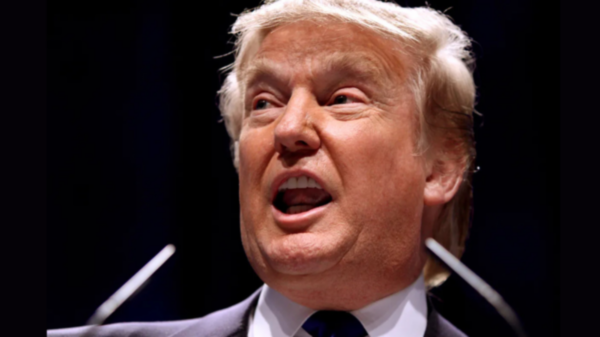By THE CITY
Haitian Times
Reprinted – by Texas Metro News
https://haitiantimes.com/
Two planks of the Republican nominee’s agenda would have devastating consequences on the city’s fortunes, economists and scholars say.

Overview:
This article examines the economic impact of Donald Trump’s proposed mass deportation plan and broad tariffs on New York City. Experts argue that deporting undocumented workers and some legal immigrants would shrink the city’s workforce by hundreds of thousands, disrupting consumer spending and economic growth. Trump’s proposed tariffs could also sharply raise consumer prices, hitting low-income New Yorkers hardest. The report includes perspectives from New York City Comptroller Brad Lander and local economists, who outline the risks to both jobs and tax revenue if these policies are enacted.
This story was originally published by THE CITY. Sign up to get the latest New York City news delivered to you each morning.
At last week’s rally at Madison Square Garden, Donald Trump yet again pledged to “launch the largest deportation program in American history.” According to him, deporting millions of immigrants, including those who are undocumented and those who are here legally, will free up millions of jobs, especially for Black and Hispanic Americans.
The Republican presidential candidate has also contended during the campaign that imposing tariffs on all imports into the United States will be “beautiful,” as the revenue will allow the government to reduce taxes while leading to a boom in domestic manufacturing.
But virtually no reputable economist or scholar of immigration believes he is right on either count. A tiny minority of economists say he could be right on tariffs, but the vast majority say he is completely wrong.
And Trump’s immigration and tariffs policies, should he succeed in implementing them, would be a devastating blow to New York’s economy, according to economists who study the city.
Mass deportations would reduce the city’s workforce by hundreds of thousands of people, crippling businesses, experts say. Since immigrants spend what they earn, the economy also stands to lose billions of dollars in economic activity.
At the same time, Trump’s vast tariffs would increase prices sharply in New York, which would be especially burdensome for lower income workers who are already stressed. Meanwhile, the city would not benefit even if manufacturing activity increased sharply, economists told THE CITY.
Reliant on Immigrants
About 310,000 New York City workers were undocumented in 2022, according to the Center for Migration Studies, and that number has almost certainly increased with the recent surge of asylum seekers.
Those workers represent at least 7% of the city’s entire labor force — and could be among the first targets of a Trump mass deportation effort. About a third work in services, according to the Center; 19% in management, business, science and arts; 16% in construction and maintenance; 15% in production, transportation and material moving, and 14% in sales and office staff.
New York City Comptroller Brad Lander believes the number could be even higher. His office’s work suggests that about 100,000 New Yorkers have some form of temporary legal status, including the DACA program, temporary protected status or a pending asylum application.
He also notes that 1 million New Yorkers live in households where one or more members are not citizens, a group that would also be at risk from aggressive deportations.
“The New York economy is so reliant on those immigrants that are already here, it would be a huge hit to have workers deported or to have their family members be deported,” said David Dyssegaard Kallick of the Immigration Research Initiative.
Sending home that many people would squeeze the economy in other ways.
Consumer spending, which accounts for about 60% of New York State gross domestic product, would also be impacted, notes Lauren Melodia, an economist at the Center for New York City Affairs at the New School.
“Undocumented people aren’t just workers. Their local spending generates economic growth that creates more jobs for all New Yorkers. A loss of 310,000 working people in NYC would bring consumer spending in the local economy down, threatening existing jobs in the short-run and limiting job growth in the long-run,” she said.
Undocumented workers also pay about $3 billion in New York state and local taxes. On the federal level they pay Social Security and Medicare payroll taxes even though they are unlikely to qualify for those benefits.
Businesses would also face difficult choices in whether to protect their workers or aid authorities in finding them.
“Trump and his allies are talking about something much more intrusive than what he did in his first term,” said Kallick. “They are talking about workplace raids and detention centers. Trump has promised it will be a bloody story and he’s priming his base for something that looks bloody on TV.”
Kallick wonders if business leaders think if they indicate support for Trump or even remain quiet they will somehow avoid being a target. Some of the city’s most prominent business executives have remained silent, but the Partnership for New York City, which represents the city’s large financial, real estate and professional service firms, is willing to affirm its support for pro-immigration policies.
“Immigration policy determines the ability of American business to attract the global talent required to stay at the forefront of innovation and growth,” said Kathy Wylde, its chief executive. “Restrictions on immigration are harmful at all levels, from migrant farm labor to graduate student and professional visas.”
NYC Consumer Pain
Wylde also sides with economists who say increasing tariffs to 60% on imports from China and 20% on goods from elsewhere will be painful because their cost is passed on to American consumers.
“Even more damaging are high tariffs that distort supply chains and increase costs’” she added. “These tenets of Trump economic policy are what business fears, while welcoming deregulation and lowered taxes.”
There will likely be no boom in manufacturing jobs in the city.
While New York was once a manufacturing powerhouse with about 1 million jobs at the end of World War II, by the 1990s when employment slipped below 300,000, what remained was what are called non-durable or light manufacturing.
Today, there are only 57,000 factory jobs, or 1.2% of the 4.7 million jobs in the city, and virtually no available land to locate factories even if they could afford New York’s high taxes, land prices and labor costs.
“We haven’t lost manufacturing jobs to China. We haven’t had a durable goods manufacturing sector in decades,” said Melodia. “It will show up as higher prices for people here.”
The press office for Mayor Eric Adams, who has repeatedly called the wave of asylum seekers a crisis for New York, did not respond to a request for comment.
But Lander, the city comptroller who is running to replace Adams as mayor, has been arguing for months that immigrants, and especially asylum seekers, will benefit the city.
“Trump’s immigration proposals, especially roundups and mass deportation, are a devastating threat to New York’s economy and soul,” he told THE CITY Wednesday.







You must be logged in to post a comment Login